Related Research Articles

Ivan Stepanovych Mazepa was a Ukrainian military, political, and civic leader who served as the Hetman of the Zaporizhian Host and the Left-bank Ukraine in 1687–1708. The historical events of Mazepa's life have inspired many literary, artistic and musical works. He was famous as a patron of the arts.

Hetman of Zaporizhian Cossacks is a historical term that has multiple meanings.

Mazeppa, properly Mazepa, is an opera in three acts by Pyotr Ilyich Tchaikovsky. The libretto was written by Victor Burenin and is based on Pushkin's poem Poltava, part of the cultural legacy of Mazeppa.
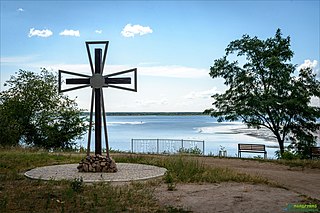
Perevolochna is a former fortress and town in the Polish–Lithuanian Commonwealth and Cossack Hetmanate, and later a village in Poltava Oblast. Before the establishment of Kamianske Water Reservoir in the 1960s, here also existed a river crossing. The settlement was situated at the bank of the Dnieper near the mouth of Vorskla River, where a ford across Dnieper enabled people to cross the river, hence its name. The crossing Perevolochna – Mishuryn Rih was also a key crossing during the Battle of the Dnieper in October 1943.
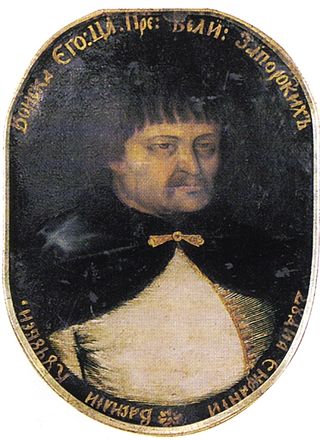
Vasily Leontiyevich Kochubey was a statesman of the Cossack Hetmanate of Crimean Tatar descent. His tenure was characterized by Pro-Moscow policies and was cut short by his execution on Hetman Ivan Mazepa's orders. Kochubey's great-grandson was the eminent Imperial Statesman Viktor Kochubey. The family name is also spelled Kotchoubey (French) and Kotschoubey.

Pylyp Stepanovych Orlyk was a Zaporozhian Cossack starshyna, Hetman in exile, diplomat, secretary and close associate of Hetman Ivan Mazepa. He is the author of the Constitution of Pylyp Orlyk.
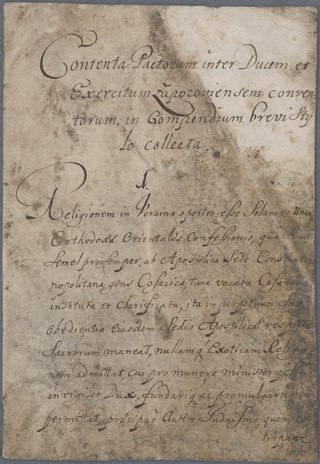
The Constitution of Pylyp Orlyk, formally titled as The Treaties and Resolutions of the Rights and Freedoms of the Zaporozhian Army, is a constitutional document written by the Hetman of Ukraine, Pylyp Orlyk, the Cossack elders and the Cossacks of the Zaporozhian Army on the 5 April 1710 in the city of Bender (Tighina) in the Principality of Moldavia. It is sometimes called the First Constitution of Ukraine.

Sweden–Ukraine relations are foreign relations between Sweden and Ukraine. Diplomatic relations between the two countries were established on 13 January 1992. Sweden has an embassy in Kyiv and an honorary consulate in Kakhovka. Ukraine has an embassy in Stockholm. Sweden is a member of the European Union, which Ukraine applied for in 2022. Both countries are members of the OSCE, Council of Europe, World Trade Organization and United Nations.
Pavlo Semenovych Hertsyk was a Ukrainian Cossack officer of Jewish origin, the colonel of the Poltava Regiment of the Cossack Hetmanate. He and his sons were important allies of Hetman Ivan Mazepa.
Grégoire Orlyk, also Hryhor Orlyk, was a French military commander, special envoy and member of Louis XV's secret intelligence service. Grégoire Orlyk was born in Ukraine, the son of Ukrainian hetman in exile Pylyp Orlyk and Hanna Hertsyk. He received a good education in Sweden, served in Poland and Saxony, and participated in the secret efforts of France to restore Stanisław Leszczyński to the Polish throne. He later commanded the king's regiment of Royal suédois. For his intelligence work and military exploits he was given the title of comte and promoted to the general's rank of Maréchal de camp. Grégoire Orlyk was an acquaintance of the French philosopher Voltaire, and championed the Ukrainian cause in France and other countries.
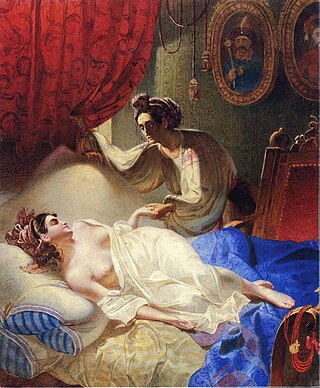
Poltava is a narrative poem written by Aleksandr Pushkin in 1828–29 about the involvement of the Ukrainian Cossack hetman Ivan Mazepa in the 1709 Battle of Poltava between Sweden and Russia. The poem intertwines a love plot between Mazepa and Maria with an account of Mazepa's betrayal of Tsar Peter I and Peter's victory in battle. Although often considered one of Pushkin's lesser works and critiqued as unabashedly imperialistic, a number of critics have praised the poem for its depth of characterization and its ability to synthesize disparate genres. The poem inspired Tchaikovsky's 1884 opera Mazeppa.
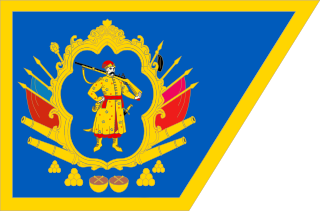
The Hetman of the Zaporizhian Host was the head of state of the Cossack Hetmanate in what is now Ukraine. The office was disestablished by the Russian government in 1764.

Kost Hordiienko was a Zaporozhian Cossack Kish otaman. After 1709 he allied with Ivan Mazepa, and co-authored the Constitution of Pylyp Orlyk.
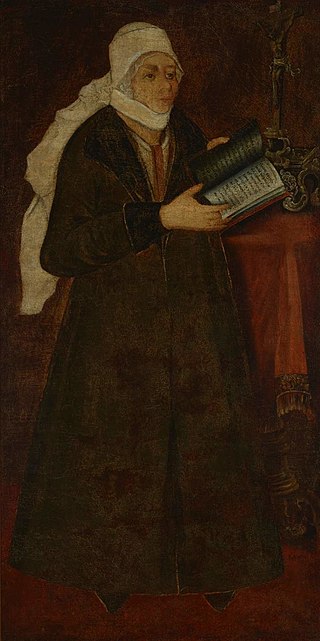
Helena Stetkiewicz or Olena Vyhovska, was a second wife of Ivan Vyhovsky, Hetman of Zaporizhian Host in Cossack Hetmanate.

Kochubeyevsky Park is a monument of landscape art of local significance in Baturyn, Nizhyn district, Chernihiv region, Ukraine. It is a part of the National Historical and Cultural Preserve "Hetman's Capital".
The History of Ukrainian literature includes laws of the historical and literary process, literary genres, trends, works of individual writers, features of their style, and the importance of artistic heritage in the development of Ukrainian literature.
Andriy Ivanovych Voynarovsky was a member of the Zaporozhian Army during 1701–1716. He is the nephew and heir of Hetman Ivan Mazepa through his maternal line.
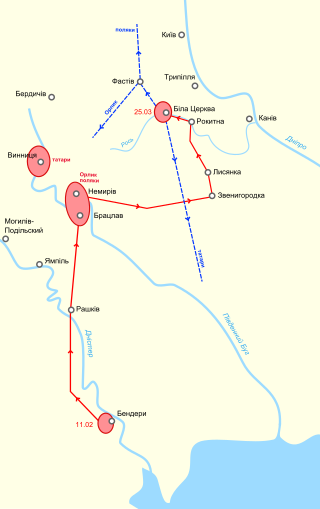
Pylyp Orlyk's March on the Right-bank Ukraine was the military campaign of the Hetman Pylyp Orlyk on the Right-bank Ukraine in January–March 1711 in order to liberate its territory from Moscow's troops and to restore the hetman's power.

The Great Northern War in Ukraine (1708–1713) — war between the Tsardom of Russia on one hand and the Swedish Empire and the Ottoman Empire on the other.
Battle of Lysianka 1711 in February—March 1711 took place during the Pylyp Orlyk's campaign of 1711 against the Russian Tsardom and against Pro-Russian cossacks.